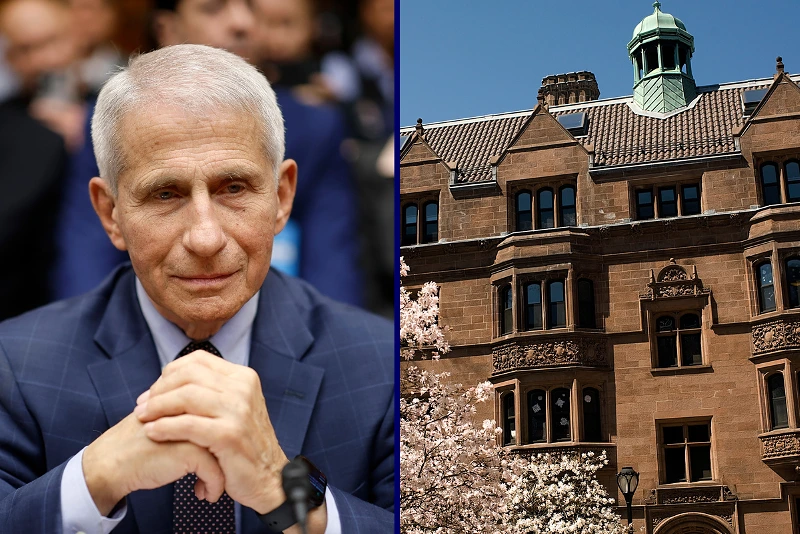

OAN Staff Brooke Mallory
3:57 PM – Thursday, February 20, 2025
Yale University’s top scientists have identified an extremely concerning condition associated with mRNA COVID-19 vaccines – which they say has been shown to alter the biology of your body.
Advertisement
The “post-vaccination syndrome” is a previously unidentified illness that seems to cause exercise intolerance or fatigue, tinnitus, dizziness, and brain fog, among other issues.
Years after receiving the initial injection and boosters, patients can also exhibit noticeable biological alterations — such as variations in immune cells and the presence of coronavirus proteins in their blood.
“From participants’ blood samples, the researchers looked for immune features that were different between the two groups. They found several differences in immune cell populations; those with PVS had lower levels of effector CD4+ T cells and higher levels of TNF-alpha+ CD8 T cells — both are types of white blood cells — among other differences,” according to Yale’s news outlet.
“That was surprising, to find spike protein in circulation at such a late time point,” Iwasaki added. “We don’t know if the level of spike protein is causing the chronic symptoms, because there were other participants with PVS who didn’t have any measurable spike protein. But it could be one mechanism underlying this syndrome.”
Additionally, the condition seems to reactivate Epstein-Barr, a virus that can cause flu-like symptoms, nerve issues, and swollen lymph nodes.
Nonetheless, the Yale scientists tried to reassure the public’s worries, maintaining that the findings “are still a work in progress,” and that the complete results of the study have not yet been published.
However, the results from the reputable university indicate that additional study on post-vaccination syndrome is required, according to independent specialists.
Finding out who is most at risk and how common the illness is will be the next stage of the study.
Since the mRNA COVID-19 vaccines were introduced, thousands of people have reported that they were badly injured by the shots.
“This work is still in its early stages, and we need to validate these findings,” said Yale University immunologist and research author Dr. Akiko Iwasaki.
“But this is giving us some hope that there may be something that we can use for diagnosis and treatment of PVS down the road.”
Between December 2022 and November 2023, Iwasaki’s team took blood samples from at least 42 individuals with post-vaccination syndrome (PVS) and 22 individuals without it for the new, non-peer-reviewed study.
“When they analyzed the patients’ immune systems, those with PVS had different proportions of some immune cells. It’s unclear what these differences might mean as the researchers couldn’t link them to specific symptoms,” Daily Mail reported.
The scientists also examined 134 “healthy” vaccination recipients and 134 individuals with “long COVID,” since symptoms of PVS overlap with it.
However, in March last year, Australian medical researchers at Queensland Health claimed that the term “long COVID” should be thrown out and not taken seriously. They argued that the symptoms of those who have said to be afflicted for at least a year were no different from those of any ordinary virus, like the flu.
Meanwhile, regarding Yale’s recent COVID-19 vaccine study, Epstein-Barr syndrome appeared to be reactivated in both PVS patients and those who noted symptoms of “long COVID.”
Epstein-Barr is an infection that is shared through bodily fluids like semen or saliva, and over 90% of adults are said to have had it at some point in their lives. The virus remains dormant in the body after symptoms like fever, rashes, and exhaustion go away — but it can also reactivate when the immune system is weak.
Additionally, COVID-19 spike protein levels were also much higher in PVS patients. Some of the long-term symptoms are believed to be caused by these persistent spike proteins, which tend to keep the body in an inflammatory state.
Dr. Iwasaki continued, expressing, “That was surprising, to find spike protein in circulation at such a late time point… We don’t know if the level of spike protein is causing the chronic symptoms, because there were other participants with PVS who didn’t have any measurable spike protein… But it could be one mechanism underlying this syndrome.”
In addition, Dr. Harlan Krumholz, a co-senior study author, and Harold H. Hines, a junior professor of Medicine at Yale, commented on the concerning discovery in a joint statement as well.
“Our responsibility as scientists and clinicians is to listen to their experiences, rigorously investigate the underlying causes, and seek ways to help,” they said.
The National Library of Medicine website, which is run by the National Institutes of Health, has also since reported some alarming information in regards to myocarditis, inflammation of the heart muscle, in relation to mRNA COVID-19 vaccines.
“We found the number of myocarditis reports in VAERS after COVID-19 vaccination in 2021 was 223 times higher than the average of all vaccines combined for the past 30 years. This represented a 2500% increase in the absolute number of reports in the first year of the campaign when comparing historical values prior to 2021. Demographic data revealed that myocarditis occurred most in youths (50%) and males (69%). A total of 76% of cases resulted in emergency care and hospitalization. Of the total myocarditis reports, 92 individuals died (3%). Myocarditis was more likely after dose 2 (p < 0.00001) and individuals less than 30 years of age were more likely than individuals older than 30 to acquire myocarditis (p < 0.00001).”
Myocarditis can be fatal, and a percentage of those with myocarditis may end up needing a heart transplant.
Stay informed! Receive breaking news blasts directly to your inbox for free. Subscribe here. https://www.oann.com/alerts
Advertisements below

